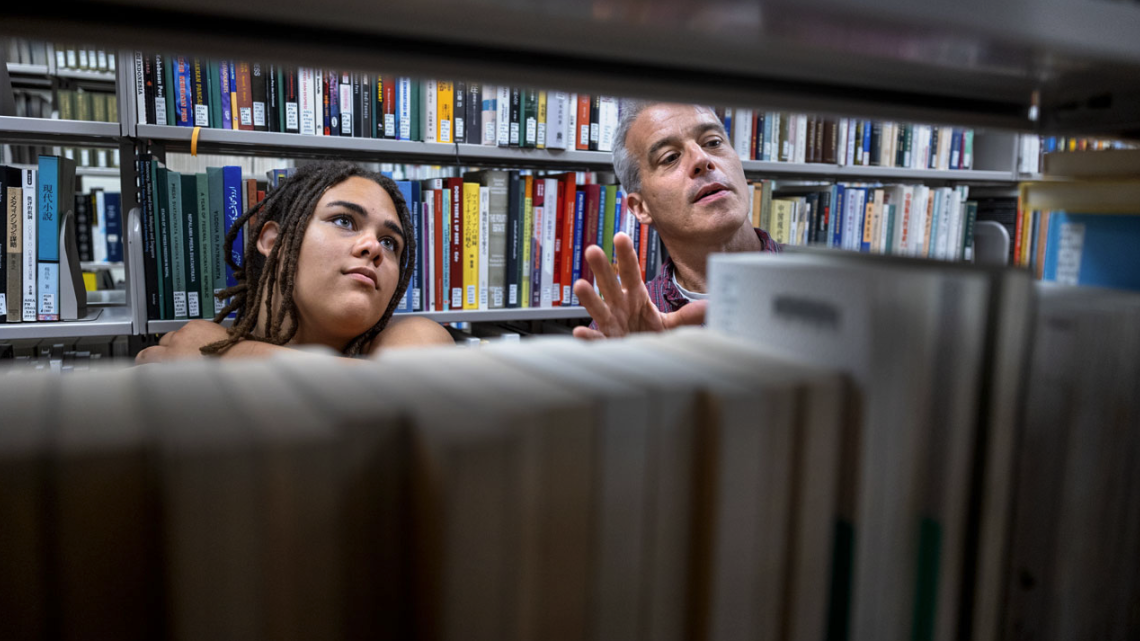
Kylie Freeman joined Upward Bound to make friends – and the program wound up easing her path to college, too.
“I probably would have moved at a slower pace” if not for Upward Bound, said Freeman, a rising senior at Dryden High School who already has a scholarship to attend Keuka College. “During this summer, I probably wouldn’t have gotten a head start on applications. I probably wouldn’t have gotten a lot of the college experiences because I wouldn’t have gone on a lot of college tours.”
Freeman was among 85 Central New York students who spent six weeks on Cornell’s campus this summer through Upward Bound, a free college preparatory program funded by the U.S. Department of Education. Because of the pandemic, the program has been virtual since 2020.
“It was nice to see people in person, and actually see how they are,” Freeman said. “Because on Zoom, everybody has their camera off or we’d be split up.”
Upward Bound is open to high schoolers from low-income families, or students whose parents don’t have bachelor’s degrees, from six local districts: Elmira, Groton, Newfield, Spencer-Van Etten, Dryden and Candor. Students join the program in ninth grade and remain until they graduate from high school.
Each participating school has a dedicated adviser for its Upward Bound cohort and students are mentored throughout the year to help them stay on track academically and eventually enroll in college. Participants receive help with skills including staying organized, making and measuring goals, SAT study strategies and college applications.
“With our new ninth-grade students, the bulk of what we’re trying to get them to understand is, why are they even in this program? To get them excited about what it can do for them,” said Liz Millhollen, associate director of Upward Bound.
This year’s summer session ran June 27 to Aug. 4; students stayed overnight on campus for a week and commuted from home the rest of the time. It’s an immersive experience where the students spend time learning in classrooms as well as taking trips, eating in dining halls, interacting with professors and groups on campus and participating in leadership building activities. The program is managed by a group of Cornell undergraduates and alumni and modeled to give participants the feeling of attending a university.
“They help us prepare and give us advice,” Freeman said about the Cornell students. “They’ve experienced college, you can kind of talk to them, like ‘How is college for you?’ I mean, everybody’s different for college, but you can take bits and pieces and make it your own.”
Thanks to excess funds left over from the virtual summers, this year’s group had the opportunity to take additional trips. Seniors traveled to New York City, juniors to Buffalo and sophomores went camping. The students also got to experience a performance by Cornell Yamatai, a Taiko drumming group, and interacted with birds of prey through the Cornell Raptor Program. Also new this year was an in-house leadership conference, which organizers hope to open to other local students in future years.
Eighty-five percent of the current program participants have maintained a grade point average of 85 or higher and 100% of this year’s graduating seniors earned a New York State Regents diploma, Millhollen said.
“We know that an on-campus experience like this has an amazing impact on students’ ability to picture themselves at college and create their own identity as college-bound,” she said. “I think that this is a great example of the broader reach the program can offer students who wouldn’t otherwise have this concentration and frequency of experiences and exposures.”
Millhollen, the only staff member on the team who had participated in an in-person summer session before this year, said it was exciting to finally see things go back to normal.
“What I like most is that we can find out where a student is interested in heading, and through our resources we can get opportunities in front of students without too much red tape or heavy lifting on the students’ or parents’ part,” she said. “We make it easier to find and take advantage of opportunities.”


